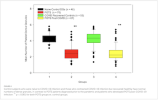Mij
Senior Member (Voting Rights)
Introduction: Postural orthostatic tachycardia syndrome (POTS), a type of dysautonomia, has been an enigma to many healthcare providers. As many as 80% of coronavirus disease 2019 (COVID-19) long-hauler patients meet the diagnostic criteria for POTS, highlighting awareness of this debilitating multisystem disorder. The etiology of POTS has not been entirely defined, but researchers have speculated that an immunological stressor such as a viral infection might be an initiating event. Prior to the pandemic, we reported that POTS patients have a bleeding diathesis with platelet dense granule storage pool deficiency (δ-SPD).
Methods: This report presents a prospective case–control study (n = 252) involving four cohorts, comprising two groups of POTS patients and two groups of healthy controls, to evaluate abnormal bleeding and patient demographics. We compared POTS patients and controls that were naïve to the severe acute respiratory syndrome coronavirus 2 (SARS-CoV-2) virus with subjects that had been infected and subsequently developed POTS or who recovered healthy. Questionnaires were employed to assess bleeding tendencies and the severity of clinical symptoms commonly reported with POTS. We utilized electron microscopy to assess platelet dense granules and enzyme-linked immunosorbent assay (ELISA) to assess COVID-19 and Epstein–Barr viral titers.
Results: The most common bleeding symptom was easy bruising in POTS patients naïve to COVID-19 (79.7%) and POTS post-COVID-19 patients (90.5%). Both groups had δ-SPD with means of 2.52 ± 0.9 and 2.44 ± 0.9 DG/PL, respectively, in contrast to a mean of 4.33 ± 0.6 DG/PL for controls naïve to SARS-CoV-2 infection and 4.19 ± 1.0 DG/PL for controls recovered from the virus (p < 0.001).
Discussion: We found that the results between the two POTS groups have no statistically significant difference. Our results identify an additional comorbidity (δ-SPD) in COVID-19 “long haulers”/post-acute sequela of COVID-19 (PASC) patients, frequently seen in POTS, that could explain several disparate symptoms often affecting the severity of the condition.
LINK
Methods: This report presents a prospective case–control study (n = 252) involving four cohorts, comprising two groups of POTS patients and two groups of healthy controls, to evaluate abnormal bleeding and patient demographics. We compared POTS patients and controls that were naïve to the severe acute respiratory syndrome coronavirus 2 (SARS-CoV-2) virus with subjects that had been infected and subsequently developed POTS or who recovered healthy. Questionnaires were employed to assess bleeding tendencies and the severity of clinical symptoms commonly reported with POTS. We utilized electron microscopy to assess platelet dense granules and enzyme-linked immunosorbent assay (ELISA) to assess COVID-19 and Epstein–Barr viral titers.
Results: The most common bleeding symptom was easy bruising in POTS patients naïve to COVID-19 (79.7%) and POTS post-COVID-19 patients (90.5%). Both groups had δ-SPD with means of 2.52 ± 0.9 and 2.44 ± 0.9 DG/PL, respectively, in contrast to a mean of 4.33 ± 0.6 DG/PL for controls naïve to SARS-CoV-2 infection and 4.19 ± 1.0 DG/PL for controls recovered from the virus (p < 0.001).
Discussion: We found that the results between the two POTS groups have no statistically significant difference. Our results identify an additional comorbidity (δ-SPD) in COVID-19 “long haulers”/post-acute sequela of COVID-19 (PASC) patients, frequently seen in POTS, that could explain several disparate symptoms often affecting the severity of the condition.
LINK


